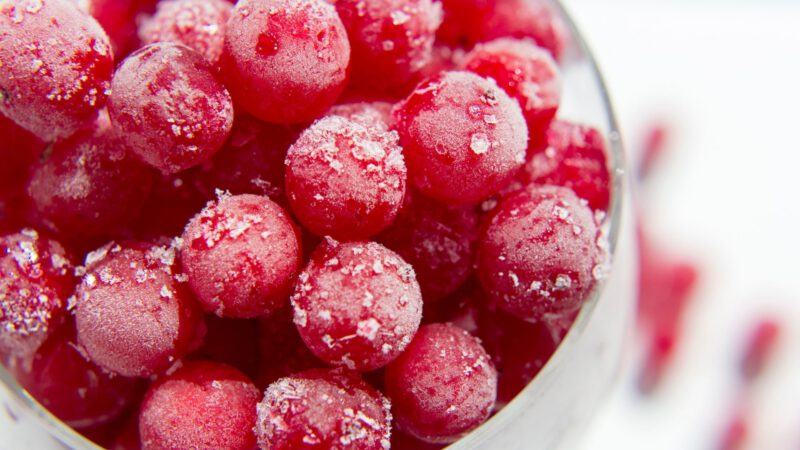Why is it worth preparing frozen food – which products are suitable for freezing and which are not
CONTENTS:
Thanks to the growing popularity and awareness of the principles of trends like zero and less waste, we are learning and relearning, among other things, how to avoid wasting food products. How to prepare for shopping, how to store food, and how to process it so it doesn't spoil too quickly and end up in the trash.
One of the simplest, most convenient, and best ways to store food is freezing. Freezing doesn't lose any valuable nutrients, and it doesn't require preservatives. It's also a good idea to keep your freezer drawers stocked with supplies, if only to avoid wasting energy storing empty containers. Most frozen foods retain their flavor and aroma after thawing. However, there are some foods that shouldn't be frozen because they may lose their proper texture and flavor when thawed. It's worth checking which products are suitable for freezing and which aren't.
Products worth using to prepare frozen food
- Vegetables – all root vegetables are suitable for freezing. Peeled and washed carrots, parsley, leeks, and celery can be placed in a mesh bag, glass, or plastic container with the date marked on the vegetables. Vegetables prepared this way make an excellent base for any soup. This way, we can store Italian food for up to a year.
- Mushrooms - They can be frozen raw after cleaning them with a knife and wiping them with a damp cloth. Smaller mushrooms can be frozen whole, larger ones sliced. Mushrooms with dense, non-lamellar flesh, such as porcini mushrooms, boletus, butter mushrooms, and Cossack mushrooms, are suitable for freezing raw. Chanterelles, chanterelles, or kites can also be frozen after cooking and drying. Please note that thawed mushrooms should not be refrozen.
- Dumplings – those with meat can be kept in the freezer for three months, while others, such as Russian dumplings with cabbage or spinach, can be kept for half a year.
- Berries – like strawberries, blackberries, wild strawberries, and raspberries. They're perfect for homemade compote for dinner, especially when we miss the fruity flavors of summer in winter.
- Vegetable or meat broth is a ready-made base for any soup, sauce, or risotto. It also makes a great warming drink for colds. Simply take it out of the freezer and heat it up.
The following are also suitable for preparing frozen food:
- Cream soups (without potatoes, pasta or rice),
- hard yellow cheese,
- raw yeast,
- raw dough for pizza or dumplings,
- bread,
- Protein,
- some cakes, e.g. poppy seed cake or apple pie.
Foods that are not suitable for freezing
The freezing process has a negative impact on some products. After thawing, they lose their texture, smell, and taste; some even become completely bitter and tasteless. Here's a list of foods that shouldn't be frozen.
- Vegetables with high water content, such as tomatoes, cucumbers, radishes, lettuce, cabbage, or celery, as well as garlic and onions, and herbs such as basil and thyme, are not allowed. The water content causes ice crystals to form, destroying the structure of the vegetables. After thawing, they appear rotten.
- Fruits with high water content – the same principle applies to watery vegetables. We don't freeze watermelons, kiwis, apples, citrus fruits, or grapes.
- Starchy foods. If you freeze them after cooking, they will turn gray, mushy, and unappetizing upon thawing. These include rice, potatoes, and pasta. Therefore, we shouldn't freeze soups or salads containing them.
- Dairy products, i.e. soft cheese such as mozzarella and ricotta, yogurt, milk, and cream. After thawing, they become completely unappetizing, lose their consistency, and disintegrate.
- Oils, mayonnaise, boiled eggs and foods containing jelly are also not suitable for freezing.
- Juices, smoothies, cocktails and other drinks – after freezing, they increase in volume and can burst the container in which they are stored.
Freezing is a great solution if you want to extend the shelf life of products or ready meals for a while and avoid wasting them. The important rule is that you should not refreeze food.
To make it easier to control what should be eaten at a given time, it's a good idea to label food items with information about when the product was frozen. It's worth preparing seasonal vegetables and fruits, so we can enjoy their flavor even out of season. Frozen seasonal fruits like strawberries are a better solution than imported fruits, which often contain preservatives and chemicals.THE PUBLISHER'S CHOICE
Dried plums 1 kg BIOGO
- £6.07
- £6.07
- Prezzo unitario
- / per
Dried White Mulberries 500 g ORGANIC
- £5.06
- £5.06
- Prezzo unitario
- / per
Almonds 1 kg BIOGO
- £10.13
- £10.13
- Prezzo unitario
- / per
Cranberries sweetened with apple juice organic 1 kg BIOGO
- £14.19
- £14.19
- Prezzo unitario
- / per
Dried dates 1 kg BIOGO
- £3.65
- £3.65
- Prezzo unitario
- / per
Unpeeled buckwheat groats 1 kg BIOGO
- £2.44
- £2.44
- Prezzo unitario
- / per
Walnuts 800 g BIOGO
- £7.50
- £7.50
- Prezzo unitario
- / per
Peeled sunflower seeds 1 kg BIOGO
- £2.63
- £2.63
- Prezzo unitario
- / per
PULLED ORGANIC SUNFLOWER SEEDS 1 KG BIOGO
- £3.85
- £3.85
- Prezzo unitario
- / per












































































































































